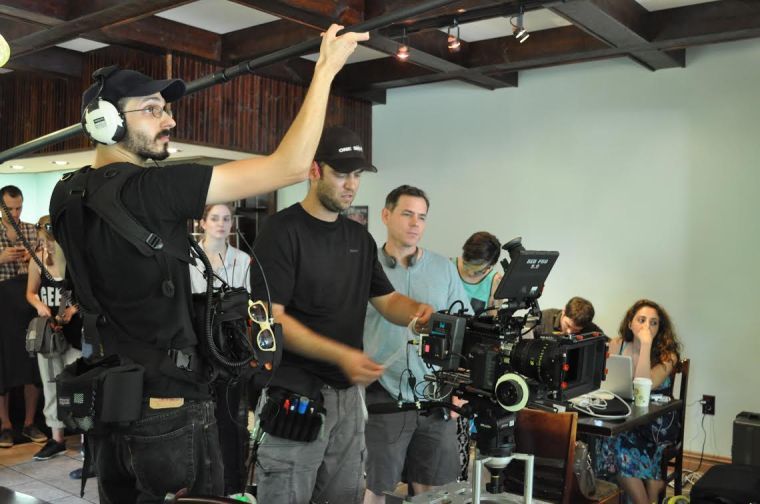Steeltown’s Film Factory seeks to liberate local filmmaking talent
May 13, 2014
For some college students, writing can be a cruel and unusual punishment. Eight hundred words might seem like 800 lashes to those who begrudgingly fulfill their general education “W” requirement.
But for Stephen Knezovich, writing in college was a much more casual exercise — something to pass the time.
“It was not something I took seriously,” Knezovich said. “Just me and a couple buddies messing around, being bored and trying to entertain ourselves.”
Knezovich is one of three finalists in Steeltown Entertainment Project’s Film Factory competition, which awards up to $30,000 to an amateur Pittsburgh screenwriter. The winner then produces his or her 12-page short film right in the city.
On Saturday, Steeltown will host its annual “And the Winner Is” event at Point Park University’s GRW Theater Downtown, where the three final scripts will be given a live table-read, and a winner will be named. The finalists include Knezovich, Julie Jigour and Randy Kovitz.
Carl Kurlander, president and CEO of Steeltown and a senior lecturer at Pitt, is responsible for discovering these (mostly) fictionalized stories.
As a writer on ‘80s mainstays “St. Elmo’s Fire” and “Saved by the Bell,” Kurlander gained decades of experience on the West Coast, but chose to return to Pittsburgh in 2001 to tap into the city’s movie making talent.
The idea of a screenwriting contest was originally conceived by Kurlander and Eric Gold, a manager whose clients have included Vince Vaughn, Ellen DeGeneres and Jim Carrey. According to Kurlander, Gold told him that “there’s so much talent in this town; we need to find a way to liberate that talent.”
So instead of taking the ideas of Pittsburgh writers and sending them to Hollywood for rewrites — which Kurlander joked was an early plan — Steeltown decided to let the writers produce the films themselves. In many ways, it aims to give the talent in Pittsburgh a crash course in filmmaking based around their screenplay.
“The Film Factory has been a great training ground for people,” Kurlander said. “A lot of people who work on these films ended up working on the bigger films when they come to town, because they know what it’s like to be on a set.”
2014 marks Knezovich’s fourth consecutive year participating in the 5-year-old Steeltown competition. In 2011, he was a semi-finalist for his script, “The Blonski,” about a new sandwich made to rival Primanti Bros.’ wacky formula.
Knezovich’s writing career began with writing and filming short comedy sketches with college buddies, but it eventually became a more serious enterprise as he went on to earn his MFA in creative writing from Eastern Washington University. He currently works as an associate editor and mentoring director for the magazine Creative Nonfiction, and has seen his career in writing come full circle in the last 10 years.
This year, the screenplay sending Knezovich to the finals is entitled “Franksgiving” and takes an alternative approach to food. The one-sentence logline goes like this: “It’s Thanksgiving, and bowler Frank Ovitchovic has two things on his mind … throwing strikes and feeding half the neighborhood.”
Every year, Frank participates in the “Annual Thanksgiving Turkey Bowl-A-Thon: Bowl a Turkey, Win a Turkey,” an event in which a perfect score nets the winner 280 pounds of turkey for his neighborhood’s Thanksgiving dinner. For years, he’s succeeded with flying colors, since he is only able to bowl strikes.
When Frank’s method of exclusively bowling strikes implodes, the wheels really fall off. Knezovich said the comedic story is primarily about Frank’s recovery from this “fall from grace.”
For Knezovich, screenplays and stories for Creative Nonfiction have more in common than their formatting may suggest.
“Stories are stories, whether they’re true or fictionalized,” he said.
To give finalists exposure to people who are much more seasoned on movie sets, Steeltown assembles a panel of experts to evaluate the screenplays and eventually select a winner.
This year’s panel of experts includes Lauren Elmer, the head of post-production for A24 Films (“Spring Breakers,” “Under the Skin”), Daniel Hoyos, an independent film producer and director of the Seattle Shorts Film Festival and Kristen Bell, the festival director of Austin’s Fantastic Fest.
Elmer, who graduated from Pitt’s film studies program in 2003, primarily focuses on the distribution and business angle of post-production with A24 Films. But in college, she, too, dabbled in the writing process.
“I took Carl [Kurlander’s] screenwriting class,” Elmer said. “He had such insight into the industry — what LA was like.”
Though she hasn’t notched any screenwriting credits of her own, Elmer’s experience in post-production has nonetheless shaped how she approaches a script.
Whether it’s a new entry in the Marvel Universe or the latest Harmony Korine film, a major goal for most productions is to not lose money. In fact, Steeltown’s first stipulation for the script entries, after their length, is that they’re “commercially viable.” Elmer acknowledged that it’s a difficult criterion to identify.
“I don’t know if there’s a formula to writing a story that will definitely be commercial,” she said.
Though she also doesn’t adhere to any particular formula when reading Film Factory entries, she does look for “compelling characters, good dialogue, interesting, out-of-the-box ideas and central conflict.” No small order.
“I think it’s hard when you’re writing a short piece – you really have to pack a lot in,” Elmer said.
And even though the bankability of a film can be a crucial factor in determining whether it sees the screen, Elmer points to an equally, if not more, valuable currency of audience reaction and dialogue.
“What I look for is something interesting and unique,” she said. “Something that is compelling enough that even if the initial idea is a little bit strange, it will spark a conversation.”








